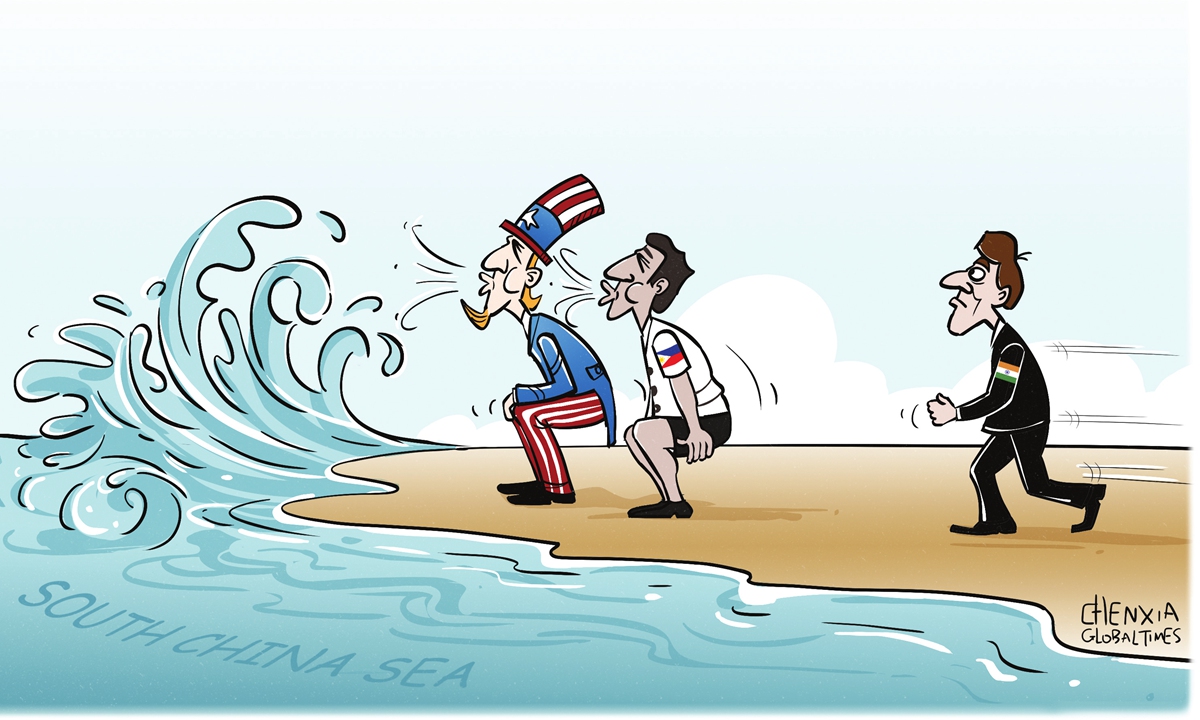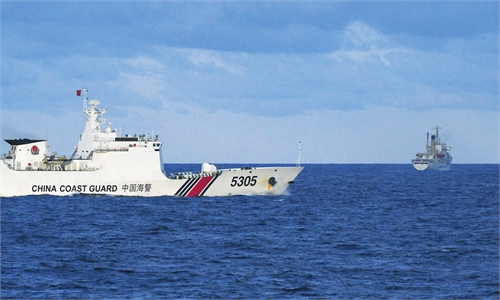
Illustration: Chen Xia/Global Times
External Affairs Minister of India Subrahmanyam Jaishankar has just concluded his five-day tour in Singapore, the Philippines and Malaysia from March 23 to 27. India's relations with ASEAN countries have witnessed a slow growth for various reasons, lagging far behind its relations with countries like China, Japan, South Korea, Australia and New Zealand.
Jaishankar's visit is not purely for diplomatic purposes. India is not particularly enthusiastic about developing relations with the Philippines, with very little bilateral trade and minimal bilateral investment. However, since India views China as a strategic rival, its motivation to draw countries that have conflicts with China, especially over territorial sovereignty disputes, grows stronger. After meeting with his Philippine counterpart in Manila this week, Jaishankar called for "staunch adherence to a rules-based order," and reaffirmed "India's support to the Philippines for upholding its national sovereignty."
Jaishankar's remarks are nothing but a one-sided attempt to cozy up to the Philippines, and he may not even believe his own words. After all, India shows little interest to developing relations with neighboring countries in line with the so-called rules-based order. Jaishankar is just hoping that these "rules" will be effective for other countries, but not binding for India. This is typical double standards, as that of the West.
India hopes that the Philippines will engage in a long-term entanglement with China in the South China Sea, depleting China's strategic resources, tarnishing China's image in the international community, and diverting China's attention in India-related issues. This delusion will not succeed. Any actions by China in the South China Sea will not affect maintaining sufficient strategic vigilance in South Asia. Safeguarding border security and territorial integrity is sacred and eternal missions that the Chinese military and people always bear in mind.
India's so-called support to the Philippines for upholding its national sovereignty is completely a biased statement. Currently, the Philippines is not defending its national sovereignty in the South China Sea, but rather attempting to encroach on China's sovereignty. If Jaishankar wants to support the Philippines in provoking China in the South China Sea, it could be seen as a highly competitive, even provocative or hostile, stance.
In fact, Southeast Asian countries also believe that the Philippines, by catering to the US and deepening strategic cooperation with the US, is provoking China in the South China Sea, which goes against the principles of the ASEAN Declaration on the South China Sea and the Declaration on the Conduct of Parties in the South China Sea. Moreover, this also disrupts ASEAN's unity and cohesion. Some Southeast Asian countries hold the view that the Philippines' actions provide new opportunities to increase US military presence in the Asia-Pacific region and escalate regional tensions. Such moves will not be conducive to resolving the South China Sea disputes and may affect cooperation in other areas among regional countries. India's involvement in the South China Sea will also pose a significant negative impact on China-India relations, forcing China to be vigilant against the Indian government's potential intention to stir up more trouble during the upcoming Indian elections, especially in border issues, as well as trade and investment issues.
Jaishankar may see his statements in the Philippines as a coordinated action jointly with the US and Japan, rather than a move that will make India a follower of the US. However, many other regional countries might not necessarily share his view. They may view India as becoming a country subservient to the US' will, like Japan. On the other hand, given that the US and Japan only provide logistical and verbal support to the Philippines on the South China Sea issue, India's assistance to the Philippines will be even more limited.
Jaishankar may recognize this fact during his visit to Malaysia. Malaysia is also a direct party concerned in the South China Sea issue. But overall, Malaysia is adept at employing diplomatic means to calm tensions and maintain friendly cooperation with other parties involved in the South China Sea disputes. The case of Malaysia may help Jaishankar to truly feel that if the parties directly concerned can uphold the principles of mutual understanding and friendly coexistence, there is hope for a peaceful solution to the South China Sea affairs through diplomatic negotiations.
In the end, developing closer economic and trade relations with Southeast Asian countries and enhancing mutual political trust is the right way for India to maintain friendly relations with neighboring countries, rather than further stirring up trouble in the South China Sea.
The author is director of the Institute for Foreign Policy Studies at the Shanghai Institute for International Studies. opinion@globaltimes.com.cn

